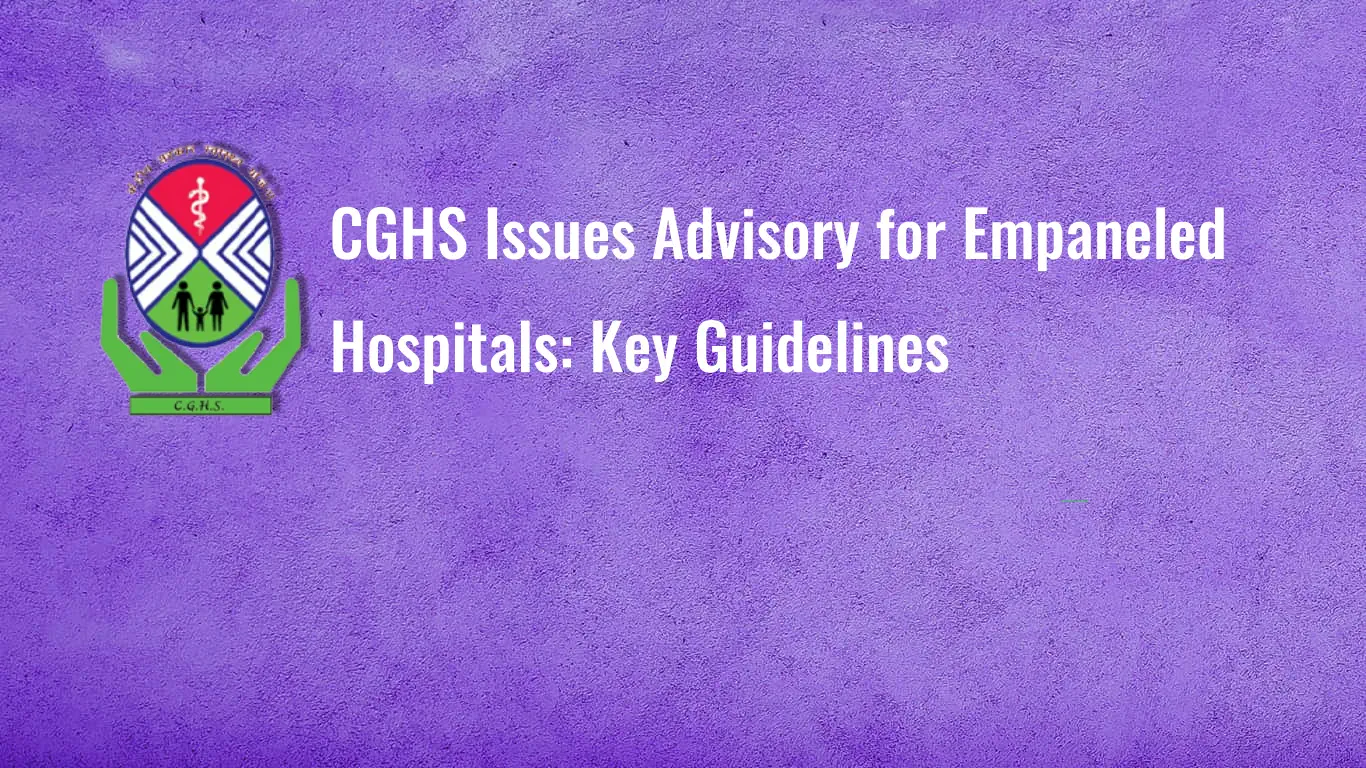CGHS Issues Strict Advisory to Empaneled Healthcare Organizations: Key Guidelines Outlined

In a bid to enhance the quality of services provided under the Central Government Health Scheme (CGHS) and curb malpractices, the Ministry of Health and Family Welfare has issued a detailed advisory to all CGHS-empaneled Healthcare Organizations (HCOs). The directive mandates adherence to specific guidelines for better compliance and improved beneficiary experience.
The advisory, issued by Dr. Satheesh Y. H., Director, CGHS, outlines key areas such as the provision of services, reporting requirements, transparency in billing, and display of critical information. Failure to comply will result in severe consequences, including de-empanelment or blacklisting.
Key Guidelines Issued to HCOs
1. Provision of Services
- HCOs must not deny services to any eligible CGHS beneficiaries.
- In cases of death of a patient or when the patient is in a coma, signatures of the attendant along with their mobile number must be obtained on final bills for all services, including indoor and OPD care, daycare procedures, laboratory tests, and dialysis.
2. Reporting Requirements
HCOs are required to report the following cases within 24 hours to the respective Additional Director’s office via email:
- Non-referral cases.
- Emergency admissions and consultations.
- Direct admissions of beneficiaries aged 70 and above, including inpatient card details.
Non-reporting of these cases will lead to non-processing of approvals by the Additional Directors.
3. Bed Availability Display
- HCOs must prominently display the availability of beds in wards and ICUs for the benefit of visiting patients.
4. Ward Entitlement
- Beneficiaries must be provided their entitled ward category. Allocating a lower category is deemed unacceptable.
5. Prescription Standards
- Prescriptions must be written in generic names and in capital letters.
- HCOs are strictly prohibited from insisting on specific brands.
6. Acceptance of Medicines
- Medicines supplied by CGHS must be accepted by HCOs.
- If an HCO declines a CGHS-restricted medicine, they must provide the purchase invoice for reimbursement.
7. Implant/Device Choices
- If a beneficiary opts for an implant priced above the CGHS ceiling rate, informed consent must be obtained. The consent must state that the additional cost cannot be claimed from CGHS, and it must be attached to the bill.
8. Information Display Requirements
HCOs are required to display the following information prominently on notice boards:
- CGHS city of empanelment.
- Charges as per CGHS-approved rates.
- Categories of beneficiaries eligible for credit, including pensioners, ex-MPs, and freedom fighters.
- Contact details of the Nodal Officer and Additional Director CGHS.
Operational and Administrative Directives
9. Nodal Officer Updates
- Any changes in the Nodal Officer’s details, including name or phone number, must be communicated immediately.
10. Portal Data Entry
- Only the beneficiary’s phone number must be entered into the BIS/TMS portal.
11. Daily Photo Uploads
- Geo-tagged photos of admitted (IPD) cases must be uploaded daily to the TMS portal.
- For OPD cases, photos taken the same day must be uploaded.
12. CGHS Help Desk/Kiosk
- All HCOs must establish a CGHS Help Desk/Kiosk on their premises to assist beneficiaries.
13. CGHS Card Handling
- HCOs are prohibited from collecting or retaining the hard copy of the CGHS card of any beneficiary.
14. Adherence to Package Rates
- HCOs must not collect any amount exceeding the CGHS-prescribed package rates.
15. Fraudulent Billing
- Submission of fake bills or forged documents by HCOs will be treated as financial fraud. Legal action, including the filing of an FIR, will be initiated against erring institutions.
Consequences of Non-Compliance
The advisory warns that non-compliance with these guidelines will result in de-empanelment, blacklisting, or other severe actions under the Memorandum of Agreement (MoA).
The circular has been distributed to all CGHS-empaneled HCOs, government ministries, and other stakeholders for immediate implementation.
View original advisory:
 Loading…
Loading…




